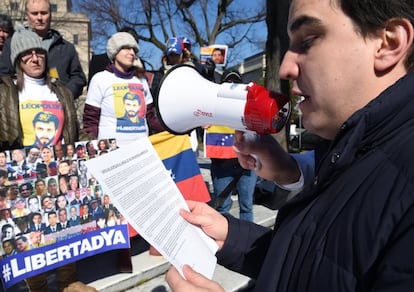Venezuela’s opposition studies ways to revoke Maduro’s term
“The president’s days are numbered,” says Leopoldo López from his prison cell

Venezuela’s opposition is moving ahead to find a legal mechanism to revoke President Nicolás Maduro’s term in office as the country’s economic, political and social crises grow worse by the day.
Maduro announced on Wednesday a series of harsh measures he said will bolster the economy, including raising gasoline prices by as much as 6,000%, hiking salaries, and devaluing the bolívar currency by 37%.
Soon after the measures were announced, Venezuela’s Central Bank (BCV) gave a grim outlook of the situation by listing inflation at 180% and reporting a 5.7% contraction of GDP last year.
Miranda state governor and former presidential candidate Henrique Capriles said that the opposition-controlled National Assembly must begin studying whether to call a revocation referendum.
Under Venezuela’s Constitution, a vote can be held on whether a president should continue in office once he serves three years of his six-year term and 20% of eligible voters sign a petition.
Maduro will complete his third year in office in April.
Our most important discussions should center on coming up with a great national agreement that will drive Venezuela for the next 100 years
Leopoldo López
Even some of Maduro’s former supporters are also questioning whether he should serve out his term.
Felipe Pérez Martí, who served as planning minister under Maduro’s predecessor, the late Hugo Chávez, has said that he didn’t think the president will still be in office five months from now if the political, social and economic situation doesn’t change.
The local media, which once feared sanctions by the government, has already begun speculating about the possibility of a Maduro exit.
National Assembly speaker Henry Ramos Allup, who supports a revocation vote, has begun receiving other proposals by groups and lawmakers calling for an amendment to the Constitution so that the presidential period is reduced to four years with the possibility of only one re-election.
For its part, Voluntad Popular, the party led by Leopoldo López – the opposition leader who was sentenced to 13 years on charges connected to the violence that occurred during nationwide protests in February 2014 – has called for a National Constituent Assembly to redraft the entire Constitution.
Leopoldo López’s freedom will depend whether Venezuela want to be viewed as a democracy once again
Ex-Costa Rican President Óscar Arias.
“The Maduro dictatorship has its hours numbered,” López said in a statement that was read by a fellow opposition leader to supporters who held a vigil to mark the second anniversary of his arrest and detention.
López called on the opposition coalition Democratic Unity Roundtable (MUD) to decide immediately what steps to take to remove Maduro from office.
“Whatever the mechanisms that are decided by a consensus to get rid of this disaster, the most important discussions we hold today should center on coming up with a great national agreement that will drive Venezuela for the next 100 years,” López said.
At a special session of the National Assembly held on Thursday, two Nobel Peace Prize winners, Óscar Arias of Costa Rica and Lech Walesa of Poland, called for the immediate release of López and other political prisoners.
The two former presidents of their respective countries were joined by Naomi Tutu, the daughter of Bishop Desmond Tutu, who also called on Venezuela to respect human rights.
“Leopoldo López’s freedom will depend on whether Venezuela once again wants to be viewed as a democracy,” said former Costa Rican President Arias.
English version by Martin Delfín.
Tu suscripción se está usando en otro dispositivo
¿Quieres añadir otro usuario a tu suscripción?
Si continúas leyendo en este dispositivo, no se podrá leer en el otro.
FlechaTu suscripción se está usando en otro dispositivo y solo puedes acceder a EL PAÍS desde un dispositivo a la vez.
Si quieres compartir tu cuenta, cambia tu suscripción a la modalidad Premium, así podrás añadir otro usuario. Cada uno accederá con su propia cuenta de email, lo que os permitirá personalizar vuestra experiencia en EL PAÍS.
¿Tienes una suscripción de empresa? Accede aquí para contratar más cuentas.
En el caso de no saber quién está usando tu cuenta, te recomendamos cambiar tu contraseña aquí.
Si decides continuar compartiendo tu cuenta, este mensaje se mostrará en tu dispositivo y en el de la otra persona que está usando tu cuenta de forma indefinida, afectando a tu experiencia de lectura. Puedes consultar aquí los términos y condiciones de la suscripción digital.








































